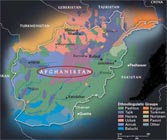Afghan civilian casualties: "The first shot hit my son"
 Kunduz, Afghanistan - Khan Mohammad is a farmer in the strife-torn Char Darah district of northern Afghanistan. One Sunday nearly a month ago, he was travelling with his son and two other civilians to nearby Kunduz city to sell melons at the market.
Kunduz, Afghanistan - Khan Mohammad is a farmer in the strife-torn Char Darah district of northern Afghanistan. One Sunday nearly a month ago, he was travelling with his son and two other civilians to nearby Kunduz city to sell melons at the market.
When they had finished their work, they set off on the 15-kilometre journey back to the village of Novabad.
But Mohammed's eldest son, Taj, never saw his home again. The 15-year-old was killed by bullets fired by German soldiers on the same day, July 19, that Operation Eagle, the largest German-Afghan offensive to date against the Taliban, began.
Mohammad, 40, was also hit. His left arm is still in plaster, and he is wearing a bandage on his other arm. His right leg is supported by a metal splint, and he had to lie on the back seat of a car on a subsequent journey to Kunduz.
But Mohammad made the difficult journey on bumpy roads to the capital of Kunduz province because he wants to tell his side of the story.
Char Darah has not only become too dangerous for foreigners, but meeting strangers there could also be fatal for Mohammad: The increasingly powerful local Taliban militants forbid cooperation with "infidels."
Friends who accompanied Mohammad to Kunduz had to help the thin man out of the car and hand him his crutches before he made his way with great difficulty to a table in the shade at a guesthouse. By the time he sits down and a stool is put under his leg, the thin hair under his cap is soaked with sweat.
Mohammad's version of what happened July 19 matched that of the German armed forces in one respect: Two military vehicles were parked off the road and had not set up a checkpoint.
Mohammad said he knows the route because he drives it regularly and knows the German army's warning signals.
"If they order it, then we stop," he said.
He sat at the righthand side in the front of the pick-up truck and kept an eye on the armoured vehicles.
"I would have seen the warning signals, but there was nothing," he said. The soldier neither gave hand signals that the truck was to stop nor fired warning shots, he said.
When the civilians had passed, the Germans shot after them, he said.
"The first shot hit my son," he said.
Taj had been sitting in the back cargo area. Mohammad and the man sitting in the middle of the front seat were hit by several shots. Only the driver on the left escaped unharmed.
"My son cried for help," Mohammad said. "I shouted back that I had been hit too and could not help."
His son died, and the father only regained consciousness at the German army hospital in Mazar-e Sharif.
Hardly a day passes in Kunduz without an attack on German or Afghan security forces, and the German army said it expected a further escalation of violence ahead of Thursday's presidential election.
The soldiers are tense. On the day Taj died, there had been information on suicide bombers in pick-up trucks, said Colonel Georg Klein, the German commander in Kunduz.
Klein disputed Mohammad's version of events on one key point: "The soldiers said concurrently and credibly that warning shots were fired."
But once more, the German government paid up to prevent a blood feud enshrined in the honor code of the Pashtun people like it did in its first incident with civilian casualties in August last year when a German soldier shot a woman and two children.
For the boy's death, 10,000 dollars was paid, and 5,000 each to the two injured men. Several thousand dollars more was paid for lost earnings, and Klein apologized, which is not the rule among other nations whose troops mistakenly kill civilians in Afghanistan.
Shooting at the civilians was a "bad action" that should not happen again, Mohammad said while adding, however, "We don't know if it was on purpose but believe it was an accident."
The Germans did not come to Afghanistan to kill civilians or occupy the country, he said he believes. "They are known for [helping in] reconstruction," he said.
Despite his son's death, he does not want the German armed forces, who retain a good image in the increasingly insecure region, to leave.
"We have forgiven the Germans," Mohammad said. (dpa)